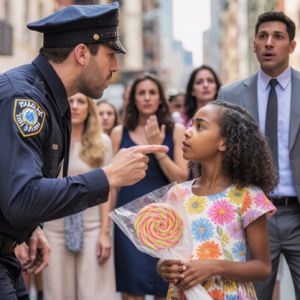
I wasn’t expecting anyone that evening. So when I opened the door to see two police officers standing on my porch, my stomach dropped.
“There must be some mistake,” I said, half trembling. But the taller officer shook his head gently. “Ma’am, your daughter reached out to us.”
I turned toward the hallway. There stood Lily Bennett, my twelve-year-old, her stuffed rabbit clutched tightly in her hands, tears streaking her face. “Mom,” she whispered between sobs, “I need to tell you something…”
The air felt thick. “Sweetheart, what’s going on?” I asked, but the officer motioned for me to let her speak.
Lily’s voice shook. “You told me not to talk about it… but I had to.”
My heart pounded. “Lily, what did you tell them?”
The younger officer spoke quietly. “Mrs. Bennett, your daughter called earlier today. She said she saw your husband, Mr. Ryan Bennett, hurt someone.”
The words didn’t make sense. “That’s impossible,” I stammered. “Ryan’s a surgeon—he’s in Denver for a conference.”
But Lily’s sobs grew harder. “It was last night, in the garage. I heard noises. I saw blood on his hands.”
I wanted to deny it, to tell her she was mistaken—but then I remembered Ryan coming home late, his shirt sleeves rolled up, a faint metallic scent clinging to him. I’d dismissed it as stress.
“Ma’am,” the officer said gently, “we need to ask some questions. May we come in?”
That night stretched endlessly. The police combed through our garage, photographing every corner. Flashbulbs lit up the faint brown smear near the tool bench—something I had somehow never noticed.

A wrench lay out of place. “Looks fresh,” one murmured.
I wanted to scream that they were wrong—that my husband wasn’t capable of violence. But pieces of doubt began to form, sharp and heavy.
After midnight, they finally left. I tucked Lily into bed, whispering, “You did the right thing.” She only stared at the ceiling, silent and pale.
At 2 a.m., my phone rang. “Claire, what’s going on?” Ryan’s voice was tight. “Detectives just came to the hospital asking questions.”
“Lily told them something,” I said. “She said she saw—”
“Stop,” he cut me off sharply. “You know me. I’d never hurt anyone.” But there was fear in his tone I’d never heard before.
The next morning, his car was found abandoned near the old harbor—blood on the seat, his ID inside. They declared him missing.
By afternoon, the media swarmed our house. Neighbors stared. My phone buzzed with sympathy and gossip. Lily barely spoke, her innocence shattered. “He’s not evil,” she murmured once. “He just did something bad.”
A week later, detectives returned. “Mrs. Bennett,” said Detective Morgan, sliding a file across the table, “we believe your husband was involved in illegal prescription sales. His colleague, Dr. Ethan Price, found out.”
My heart turned to stone. Ryan’s brother had overdosed two years earlier—I thought his restlessness was grief. Maybe it was guilt.
“We think there was a confrontation,” Morgan continued. “Dr. Price is dead. We’re still searching for your husband.”
I looked at Lily’s drawing on the fridge—our family smiling under a bright sun. She had seen the truth long before I did.
Weeks passed in numb silence. Then, one evening, I found an envelope under the doormat. My name written in Ryan’s handwriting.
Inside:
Claire,
I never meant for this to touch you or Lily. I didn’t kill him, but I can’t stay. Tell her I’m sorry. I love you both.
No signature. Just a faint smear of dried blood.
The DNA confirmed it was his.
Months later, Lily asked, “Can we move? I don’t want to be the girl whose dad hurt someone.”
So we left. A new home in Oregon, new names, new lives. But sometimes, when I hear a knock at night, my heart still races.
Because part of me believes that one day Ryan will return—not the man I loved, but the shadow of the man he became.


